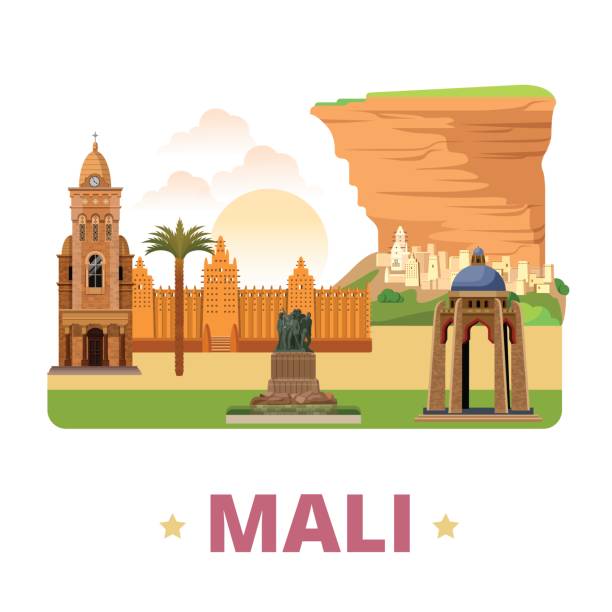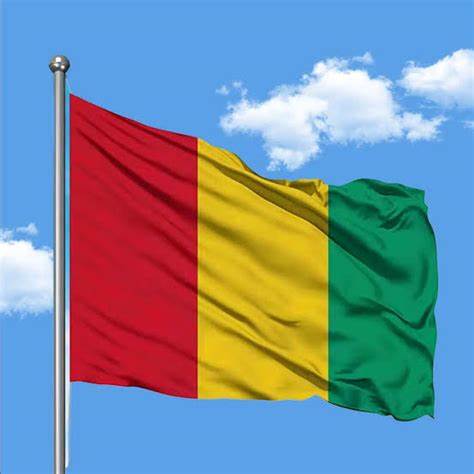Mali is a landlocked country in West Africa. It is the eighth largest country on the African continent, with an area of more than 479,245 square miles. The country is bordered to the north by Algeria, to the east by Niger(Knee-zheer) , to the northwest by Mauritania, to the south by Burkina Faso and Ivory Coast, and the west by Guinea and Senegal.
The population of Mali is just 21.9 million, 67% of which are estimated to be under the age of 21. Its capital, Bamako is its largest city. One interesting piece of information about Mali is that it has 13 official languages namely: Bambaria, Bozo, Dogon, Fula, Hassaniya, Kassonke, Maninke, Minyanka, Senofu, Songhay, Soninke, and Tamasheq. However, Bambaria is the most commonly spoken.
This African state, consists of nine regions; its borders on the north, reach deeply into the Sahara Desert. The southernmost part where the majority of its inhabitants live, is in the Sudanian savanna and both the Niger and Senegal rivers pass through.
Mali was once part of three extremely powerful and wealthy West African Empires that controlled trans-Saharan trade: The Ghana Empire, The Mali Empire, and the Songhai Empire. At its peak in 1300, The Mali Empire was the wealthiest country in Africa and one of the wealthiest on earth with its 14th century Emperor, Mansa Musa believed to be one of the wealthiest individuals in history. Besides being an economic powerhouse, medieval Mali was a center of Islam culture and knowledge with Timbuktu becoming a renowned place of learning with its university, one of the oldest in the world still active.
In the late 19th century in the Scramble for Africa, France seized control of Mali, making it part of French Sudan. A brief federation was formed with Senegal after achieving independence in 1960. Senegal later withdrew from the federation and the Republic of Mali was established.
Today Mali is a unitary presidential republic under a military junta. It has a president, prime minister and a national assembly. Religion in Mali predominantly Islam with an estimated 95% of the population, with the remaining 5% of Malians adhere to traditional African religions such as the Dogon religion or Christianity.
Mali's economic engine runs primarily on gold, cotton, cattle and live sheep. Recent gold export earned revenue in the vicinity of US$2, 657, 101.42 million, cotton yielded US$ 421,646.57 million, live bovine animals earned US$ 93,535.29 million, and live sheep tallied US 52,661.24 million. The country"s current GDP stands at USS 18.83 billion.
The population of Mali is just 21.9 million, 67% of which are estimated to be under the age of 21. Its capital, Bamako is its largest city. One interesting piece of information about Mali is that it has 13 official languages namely: Bambaria, Bozo, Dogon, Fula, Hassaniya, Kassonke, Maninke, Minyanka, Senofu, Songhay, Soninke, and Tamasheq. However, Bambaria is the most commonly spoken.
This African state, consists of nine regions; its borders on the north, reach deeply into the Sahara Desert. The southernmost part where the majority of its inhabitants live, is in the Sudanian savanna and both the Niger and Senegal rivers pass through.
Mali was once part of three extremely powerful and wealthy West African Empires that controlled trans-Saharan trade: The Ghana Empire, The Mali Empire, and the Songhai Empire. At its peak in 1300, The Mali Empire was the wealthiest country in Africa and one of the wealthiest on earth with its 14th century Emperor, Mansa Musa believed to be one of the wealthiest individuals in history. Besides being an economic powerhouse, medieval Mali was a center of Islam culture and knowledge with Timbuktu becoming a renowned place of learning with its university, one of the oldest in the world still active.
In the late 19th century in the Scramble for Africa, France seized control of Mali, making it part of French Sudan. A brief federation was formed with Senegal after achieving independence in 1960. Senegal later withdrew from the federation and the Republic of Mali was established.
Today Mali is a unitary presidential republic under a military junta. It has a president, prime minister and a national assembly. Religion in Mali predominantly Islam with an estimated 95% of the population, with the remaining 5% of Malians adhere to traditional African religions such as the Dogon religion or Christianity.
Mali's economic engine runs primarily on gold, cotton, cattle and live sheep. Recent gold export earned revenue in the vicinity of US$2, 657, 101.42 million, cotton yielded US$ 421,646.57 million, live bovine animals earned US$ 93,535.29 million, and live sheep tallied US 52,661.24 million. The country"s current GDP stands at USS 18.83 billion.

